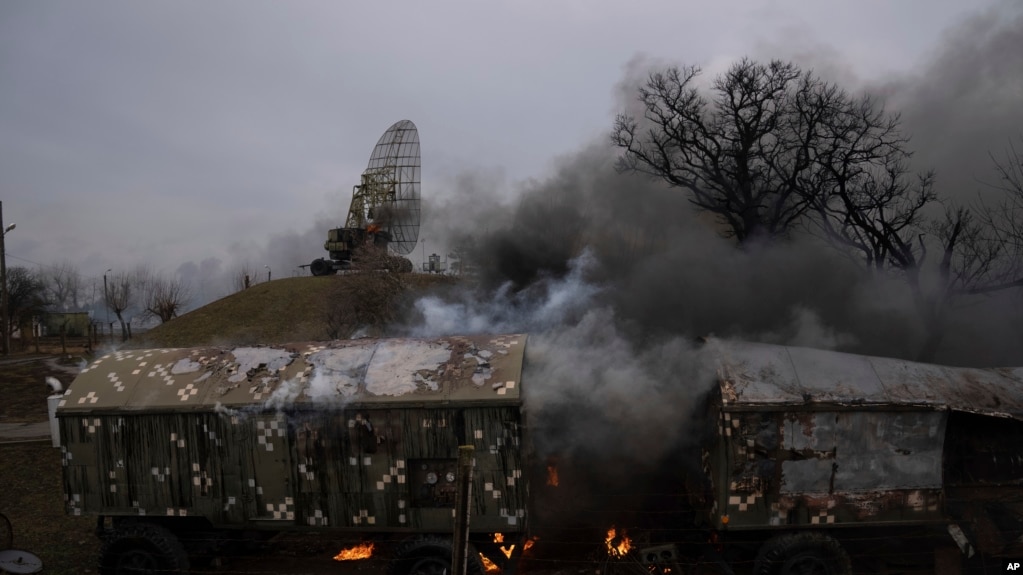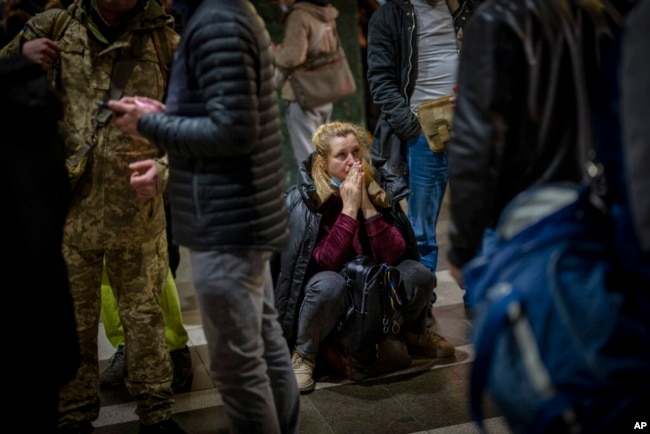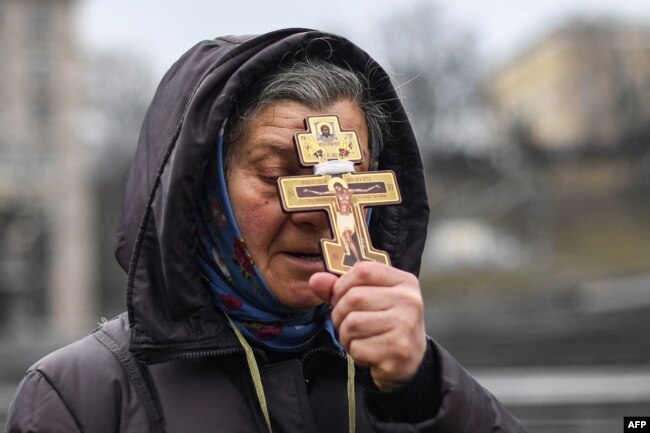
Smoke rise from an air defence base in the aftermath of an apparent Russian strike in Mariupol, Ukraine, Feb. 24, 2022. Big explosions were heard before dawn in Kyiv, Kharkiv and Odesa as world leaders decried the start of Russian invasion (AP Photo/Evgeniy Maloletka)
Russia launched an attack by air, land and sea from several directions against neighboring Ukraine Thursday.
Explosions and gunfire were heard throughout the country including the capital city of Kyiv. The mayor of Kharkiv, Ukraine’s second-largest city, said his city is effectively surrounded.
Ukraine’s military chief said Ukrainian troops were fighting the Russian army near the Hostomel airbase 7 kilometers northwest of Kyiv. In the south, he said fighting was going on near Henichesk, Skadovsk and Chaplynka.
Another Ukrainian official said Russian troops captured the former Chernobyl nuclear power plant. The plant was the location of the world’s worst nuclear accident when a nuclear reactor exploded in April 1986, sending radioactive waste across Europe.
The Russian Defense Ministry confirmed in a statement that its ground forces have moved into Ukraine from Crimea. The ministry added that it has destroyed a total of 83 Ukrainian military facilities.
In a television address from the Kremlin, Russian President Vladimir Putin warned other countries not to intervene in what he called a “special military operation.” And he said they would face “consequences they have never seen.”
Ukraine President Volodymyr Zelenskyy called on all Ukrainians to defend the country. He said arms would be given to anyone prepared to fight. He asked world leaders for help, saying that “if you don’t help us now, if you fail to offer a powerful assistance to Ukraine, tomorrow the war will knock on your door.”

World reactions
The United States and its Western allies quickly condemned the invasion. American President Joe Biden said Thursday from the White House, “Putin is the aggressor. Putin chose this war. And now he and his country will bear the consequences.”
Biden announced more sanctions that he said would hurt the Russian economy. They targeted four more Russian banks with $1 trillion in assets, high-tech and military industries, and business leaders.
The allies, however, did not enforce some of the most severe sanctions such as a limit on Russia’s energy exports or banning Russia from the SWIFT payment system. The system permits transfers of money from bank to bank around the world.
Several European nations that were once under the former Soviet Union’s orbit also condemned Russia’s actions. Poland called for the “fiercest possible sanctions” against Russia. Czech President Milos Zeman called Putin a “madman.” And Hungary’s Prime Minister Viktor Orban, who has close ties with Putin, also condemned Russia’s actions.

China, however, did not call the Russian offensive an invasion. A foreign ministry spokesman said the crisis in Ukraine has a “complex” history and China understands what it called Russia’s “legitimate concerns” on security.
From the United Nations, Secretary-General Antonio Guterres asked Putin to “Stop the military operation. Bring the troops back to Russia.” He said the world body was freeing up $20 million for urgent humanitarian needs in Ukraine.
The U.N. said several thousand Ukrainians have already crossed into neighboring countries, mainly Moldova and Romania. And an estimated 100,000 have fled their homes.
I’m Jonathan Evans.
Hai Do wrote this story for Learning English based on reporting from VOA News, Associated Press and Reuters.
Words in this Story
consequence – n. something that happens as a result of a particular action
sanction – n. an action that is taken to force a country to obey international laws
assets – n. something that is owned by a country
legitimate – adj. fair or reasonable